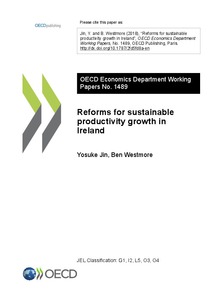Reforms for sustainable productivity growth in Ireland
"The Irish economy has experienced a decline in productivity growth over the past decade. This has mostly reflected the poor performance of local firms, with the large productivity gap between foreign-owned and local enterprises having widened. Given the mobility of foreign-owned firms, achievi...
| Main Authors: | , |
|---|---|
| Institution: | ETUI-European Trade Union Institute |
| Format: | TEXT |
| Language: | English |
| Published: |
Paris
2018
OECD |
| Subjects: | |
| Online Access: | https://www.labourline.org/KENTIKA-19301366124911295489-Reforms-for-sustainable-produc.htm |
| Summary: | "The Irish economy has experienced a decline in productivity growth over the past decade. This has mostly reflected the poor performance of local firms, with the large productivity gap between foreign-owned and local enterprises having widened. Given the mobility of foreign-owned firms, achieving sustainable productivity growth requires addressing productivity stagnation in the local business sector. Government policy should ensure high-potential businesses can enter markets and expand unimpeded, and that the most productive firms thrive in the market. To achieve this, some aspects of the regulatory environment for businesses need to be reformed and the quality of Irish infrastructure improved. Access to finance for high-performing firms must be broadened as well, through restoring credit supply in the banking sector, developing equity finance and improving public financial support. It needs to be assured that government policy is also calibrated to encourage productivity-enhancing knowledge spillovers from frontier firms. Trade linkages and research collaboration between foreign-owned and local firms can be better promoted. However, the ability for local firms to absorb new knowledge relies on their investment in knowledge based capital and managerial skills. These can be promoted by greater direct government funding of business R&D, supporting labour mobility across firms, and worker participation in lifelong learning activities." |
|---|---|
| Physical Description: | 60 p. Digital |

